![]() Hello, gentle readers, and welcome to the RPG Reload, the weekly feature where mushroom stew reigns supreme. Each week, we dust off an RPG from the App Store’s past for another play to see how it holds up. It’s a chance to revisit old favorites, reflect on a game’s place in the overall library, or simply to take a deeper dive than our usual reviews allow for. As the village paladin, I decide which games will be featured here from week to week, a task I take most seriously. I try to present a balanced slate, but if you feel like I’m missing something important, you can give me a suggestion by commenting below, posting in the Official RPG Reload Club thread, or by tweeting me at @RPGReload. I plan the schedule pretty far in advance, so you won’t see your suggested game soon, but I will add it to the master list.
Hello, gentle readers, and welcome to the RPG Reload, the weekly feature where mushroom stew reigns supreme. Each week, we dust off an RPG from the App Store’s past for another play to see how it holds up. It’s a chance to revisit old favorites, reflect on a game’s place in the overall library, or simply to take a deeper dive than our usual reviews allow for. As the village paladin, I decide which games will be featured here from week to week, a task I take most seriously. I try to present a balanced slate, but if you feel like I’m missing something important, you can give me a suggestion by commenting below, posting in the Official RPG Reload Club thread, or by tweeting me at @RPGReload. I plan the schedule pretty far in advance, so you won’t see your suggested game soon, but I will add it to the master list.
With Hallowe’en month behind us again for another year, it’s time to get back to our usual routine of hacking and slashing less seasonal monsters. Our feature this time is Valorware’s 9th Dawn ($2.99), a game I’ve wanted to get around to writing about for a while. Back when we used to do the reader’s choice articles, 9th Dawn came in second place at least a few times, so I knew I should put it on the schedule sooner rather than later. With the sequel apparently nearly upon us, I can’t think of a better time to take a look back at this unusual twin-stick, open-world, Ultima-inspired RPG. The game was fairly popular in the TouchArcade forums, and was one of those cases where nobody really knew what they were getting into thanks to the humble first impression it makes. 9th Dawn is one of those games that makes covering mobile RPGs such a fun bag of surprises. It’s both familiar and bizarre, but more than anything, it’s the kind of game that pulls you into its world until you find yourself gorged on its treats.
Like many games in this genre, 9th Dawn owes a great debt to Ultima. In this particular case, the Ultima in question is 1988’s Ultima 5: Warriors Of Destiny. Well, sort of. While it’s largely forgotten these days, Ultima Online really got the ball rolling for that whole MMO genre back in the 1990s. That game used what was, at the time, a modern RPG engine and infused it with multiplayer elements to create something that was exciting and new to many players. It inspired many other games, some commercial endeavors, others closer to fanworks. One of those was Egg’s Ultima Online, a multiplayer online RPG that drew heavily from Ultima 4 and Ultima 5. Now known as Euotopia, it has mostly outgrown its strongest links to Ultima. It’s relatively obscure in a pretty noisy segment of the market, but for at least a small group of Ultima fans, it had something of a big impact.
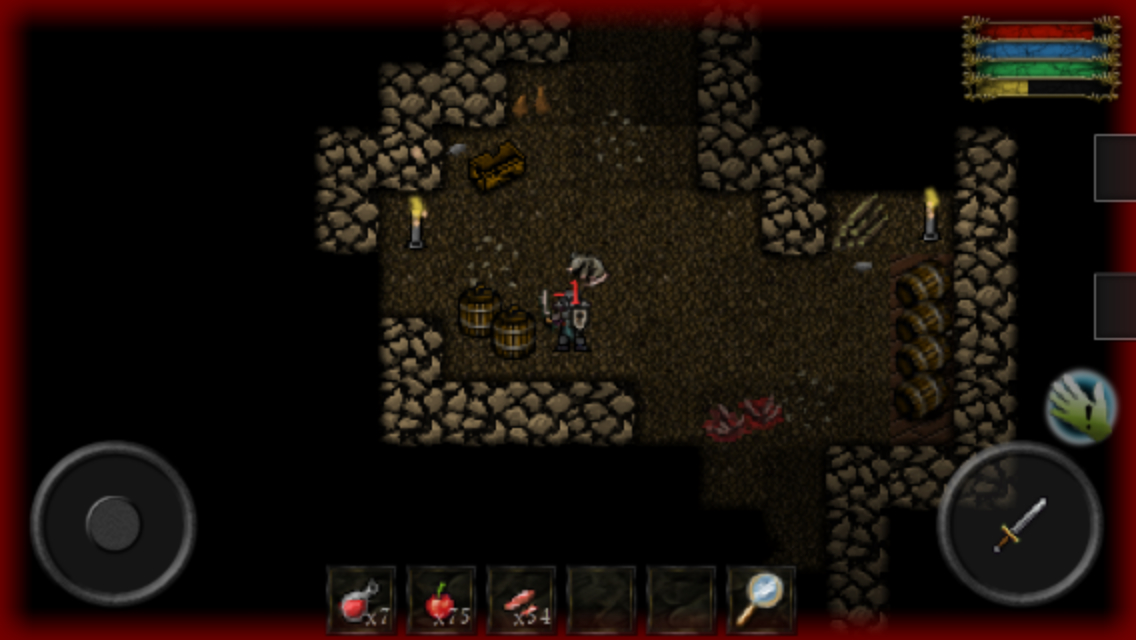
Two such fans were Charles Cross and Tom Ruki. Back in 2001, they were both playing in the same MMO world of Egg’s Ultima Online. Cross was 12 years old, and Ruki was 14, and although they lived on opposite sides of the Atlantic Ocean, their shared virtual experience brought them into frequent contact with one another. Whenever they would meet in the game, each would try to grief the other as much as possible. They eventually ended up joining forces, pooling their skills to make trouble for everyone else. That probably sounds bad if you haven’t played Ultima Online or one of its more direct clones, but it was definitely part of the game. Anyway, even mischief makers have downtime, and while chatting during one such period, Cross and Ruki discovered they had another mutual interest. Both of them had a serious interest in creating games of their own, and both had started learning programming to make that happen. They once again decided to join forces with the intention of making their own online RPG.
The fruit of those efforts was called Black Dawn Online. Before it could be finished, the team tore it all down to create Black Dawn Online 2, which also was never finished. They repeated this process several more times, with what would be the ninth attempt at making the game actually reaching the finish line in November of 2012. With the popularity of mobile gaming, there was finally a fairly simple way for the team, by now called Valorware, to publish their game and get it into people’s hands. Granted, the online aspect had to be ditched, but that could always come in a later game. The game was officially dubbed 9th Dawn, and it launched first on Android that November with an iOS release coming the following year in June of 2013. A PC release was planned, even going as far as passing Greenlight on Steam back when that was actually tough to do, but as of the time of this writing, it appears to have not made it out to the general public yet. In Valorware’s defense, the PC version is apparently a full remake of the game, which is probably a lot to chew on while simultaneously working on the sequel.
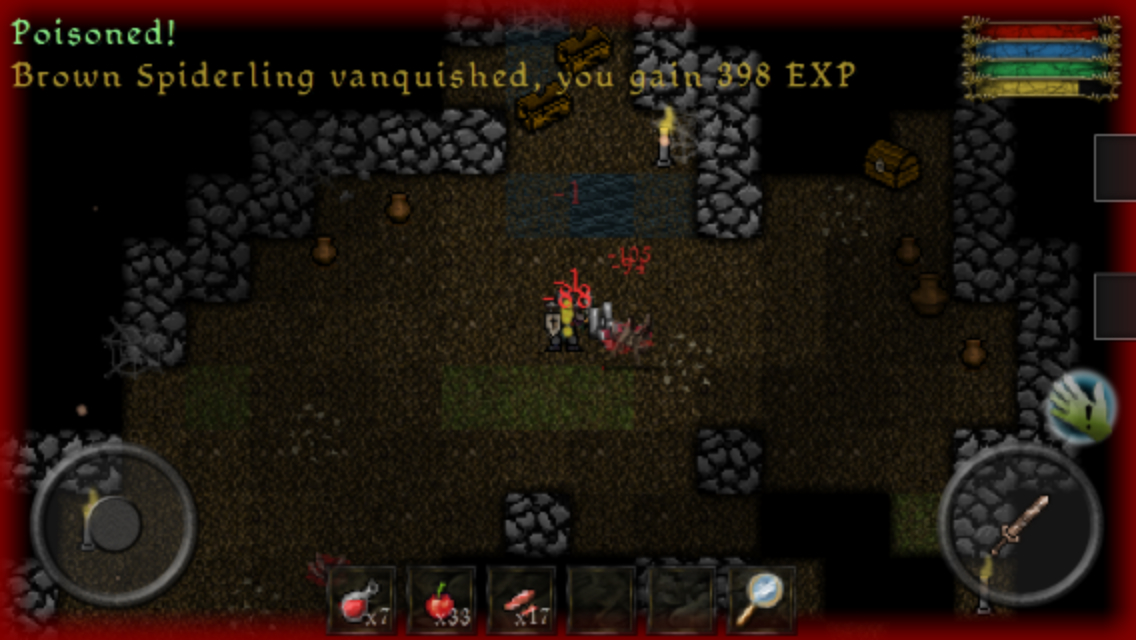
9th Dawn got off to a fairly slow start, but it eventually picked up speed and surpassed Valorware’s expectations. That’s likely why their next game is 9th Dawn 2 and not the previously-announced sci-fi title Black Frontier. I’m not sure whether the game was stronger on one mobile platform than the other, but it was certainly received warmly by players and critics on both platforms. The game received a number of updates on Android that added significant content, all of which was rolled into the initial commercial release on iOS. Since then, there has only been a single update to the iOS version, addressing a platform-specific bug that came with iOS 7. It was at least planned at one point that when the PC remake was finished, its improvements would be rolled into the mobile versions, but only time will tell if that’s still feasible for Valorware.
To tell the truth, I’m a little surprised that 9th Dawn found the success that it did. It’s an unapologetic throwback in many ways, and not in the ways that typically draw in a crowd. The game offers precious little direction to the player, doesn’t clearly explain its mechanics for the most part, and gives you a huge world to explore. It also has a few strange gameplay quirks. You can clearly see its Ultima inspirations in the size and structure of its world, but the core gameplay is that of an action-RPG. Not just an action-RPG, mind you, but a twin-stick action-RPG. You move your character around with one virtual stick, and point their weapon in whatever direction you’d like using the other. It can be a bit awkward at first, especially if you’re using the melee-bound knight class, but it ends up working quite well. On top of all of that, the visual style is deliberately calling back to 2D tile-based games from the 1980s, so unlike other open-world RPGs, it doesn’t benefit from much of an initial wow-factor.
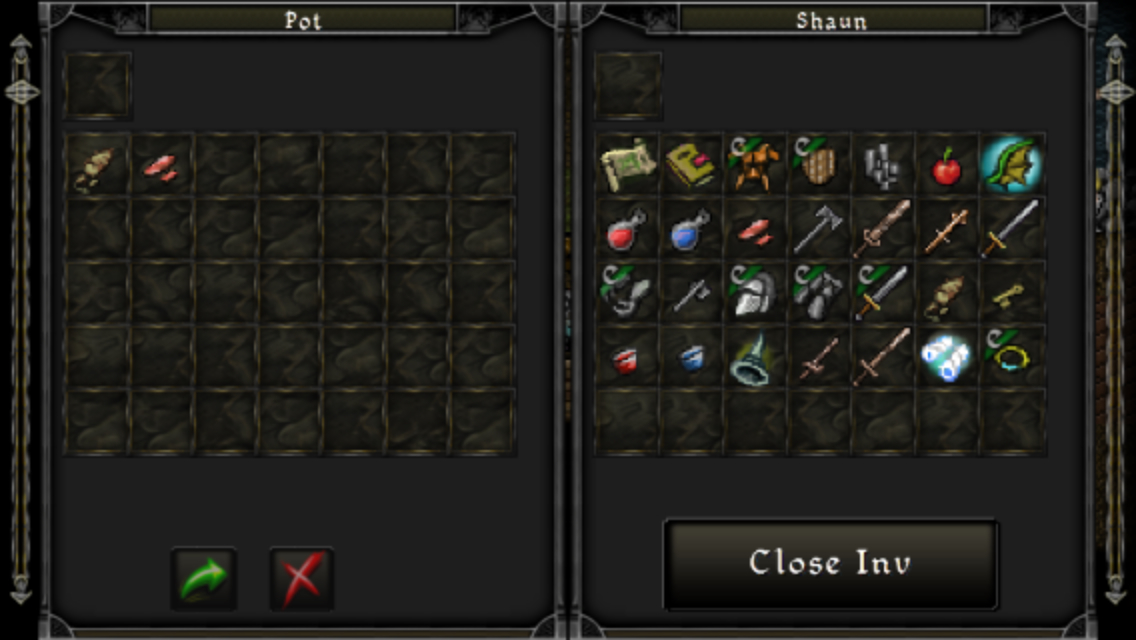
Even with all that baggage, however, the game is great. I think it’s because it hits a sweet spot between possibility and simplicity in a way that few other iOS RPGs manage to. Open world RPGs, particularly those that eschew the modern conveniences that have turned exploration into a matter of following a giant floating arrow, are often intimidating for the average player. When you’re not sure where to go, a large 3D open world will likely cause anxiety in as many people as it excites. It gets even more divisive when you add in things like skill trees, crafting, and so on. I’m part of the group that doesn’t mind that stuff, and relishes it even, but I can completely understand it turning people off.
I think 9th Dawn understands that, too. While its use of a 2D map is likely just as much to do with resources as it is a design choice, the gameplay points to a developer that wants people to just slide into the world and start having fun. There are only three classes to choose from, and it’s quite obvious what each is good at. Leveling up allows you to allocate attribute points, but the game is pretty clear about which stats benefit your class, so there’s little need to worry about where to put them. Battles, at least initially, don’t involve much more than pointing the business end of your offensive ability at the enemy until they die. Quests are generally straightforward, and if you have trouble finding where to go, you can even click open a hint that will more or less tell you what you need to do. You can save anytime you’d like to, and the game will resume right at that spot, for better or worse. Dying carries a very minimal penalty to your experience, one that likely won’t even come close to matching whatever you had gained on your fateful outing, and sends you back to your marked spawn point, which is probably going to be in a safe place.
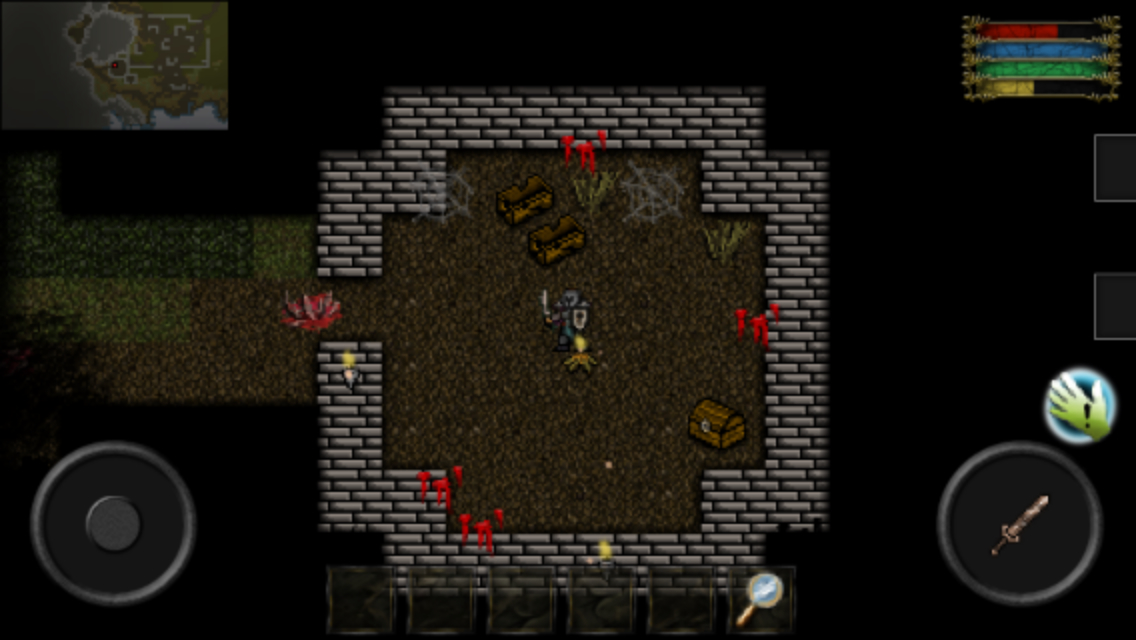
It’s easy to play, something I think is essential to its success. The other side of the coin, however, is in how little it does to hold your hand. You’ll get a little guidance in the beginning, provided you’re wise enough to talk to people nearby. You can choose to follow it or not. Nothing will stop you from doing the latter, but even if you opt for the former, once you’ve finished a couple of small dungeons, you’re on your own. There’s a main quest of sorts to finish, though it’ll probably take you a good, long while to stumble on it, and some extra expansion content after that, even. But those early hours with the game are going to involve poking around the massive map, deciding on your own which directions to go, and sticking your arm into situations to see if it comes back a stump or not. There are plenty of interesting places to come across, along with non-essential dungeons, caves, and so on. You’ll find some good treasure in them sometimes, while other times, you’ll just find a lot of bad guys to kill. You might even catch a few whiffs of story, if your imagination is willing. Why are there bloody remains next to this out-of-the-way campfire that had a bunch of goblins hiding in the surrounding trees?
The game won’t tell you most of the time, and I kind of like that. We get big open worlds often in games nowadays, but they usually feel like they’re there for the player and no one else. So if you come across something weird, of course there’s a description or reason to find. That’s not how life works, though, and that might be why I enjoy how 9th Dawn‘s world is structured. My friend and I used to go into the woods near our houses a lot when we were kids. We would often come across strange sights like abandoned books or tools. Sometimes we would see ramshackle structures, long abandoned. What had happened in these places? Who knows, and young kids probably shouldn’t have been poking their noses into places like that to try and find out, in hindsight. Games like 9th Dawn bring out similar feelings in me. It’s counting on the idea that people don’t just want a big map filled with breadcrumbs leading to the next story point or achievement. They want to feel like explorers in the way that our modern reality doesn’t offer. And if my history classes have taught me anything, a big part of exploring is not having a hot clue about what’s in front of you.
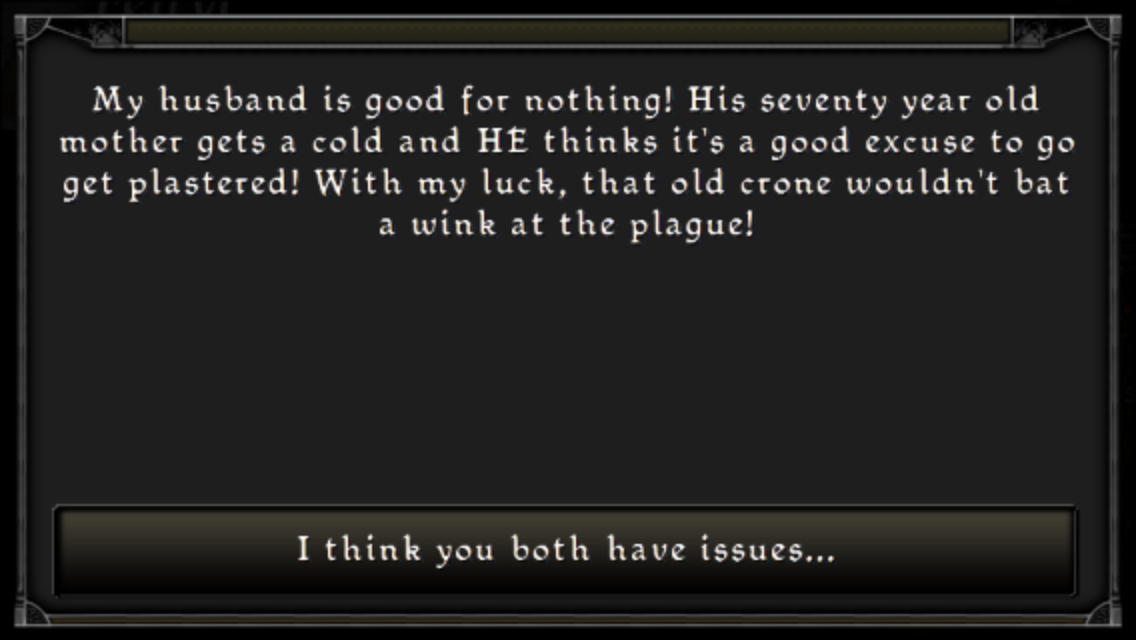
So 9th Dawn succeeds in two major ways: the basic gameplay is easy to grasp and rewarding, and the world it puts in front of you promotes exploration for exploration’s sake. That simple combination makes for a compelling game alone, and it’s a good thing, because in a lot of other ways, 9th Dawn is a mess. The UI is clunky, especially for handling inventory chores. Comparing weapons and armor takes far too many menus and submenus, and the menu itself will actually obscure the text explaining why you can’t equip something yet. Selling and buying multiple items can be a real pain, but one you’ll have to tolerate due to the sheer amount of items and gear you’ll come across that is meant for the two classes you didn’t select.
The game balance is disastrous, too. It’s a little tough in the beginning, but after you get a few levels under your belt, you probably won’t die again for a very long time. It gets hard again near the end, but you spend most of the game just stomping all over everything. The job classes are also somewhat poorly balanced, with the knight having a much harder time of things than the other two due to his lack of ranged offensive capabilities. This is also not the game for people who enjoy explicit story-telling or interesting characters, in spite of its Ultima roots. The main plot here is pretty flimsy and might as well not be there for all the good it does the game, and while characters have personality, they all more or less seem to share the same one. Luckily, very little of this matters when you’re stabbing bears in the head in the middle of a cave you discovered while hiking through a forest at night.
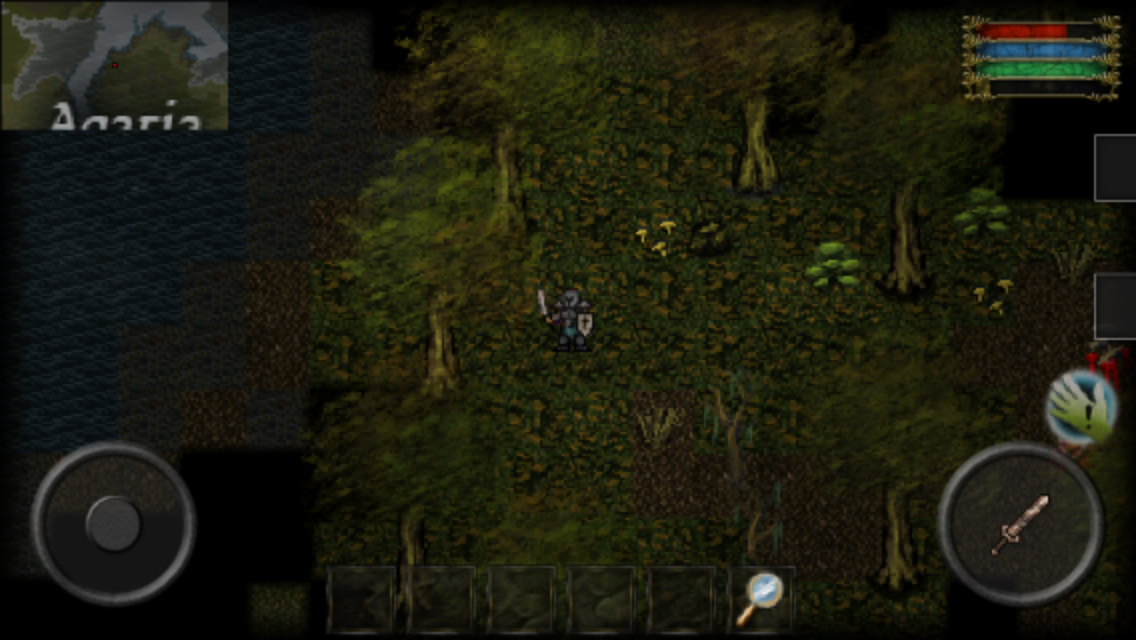
As mentioned earlier, 9th Dawn hasn’t been updated in around two years. It has the occasional crash here and there in newer iOS versions, a problem that seems to get a bit worse the farther into the game you go. Fortunately, the app is a very diligent auto-saver, but it’s still troublesome. It also doesn’t support the larger screen sizes of the iPhone 6 family or MFi controllers. I hope Valorware carries through on their plans to update the app after 9th Dawn 2 is out. It’s not in a sorry state by any means, but it could definitely do with a little maintenance at this point. It’s perfectly playable apart from the occasional crash or bug, though, and I think those kinds of things are hard to avoid with a large world full of persistent changes made by the player.
In spite of its inspiration, basic appearance, and allowance for player-made chicanery, I actually don’t think 9th Dawn has a lot in common with Ultima, as it’s often touted to. There’s a similar sensibility about it, but 9th Dawn is really its own thing. Rather than being a pure throwback to vintage computer RPGs, it’s more like an offline, single-player version of a classic MMO, the sort that focused on simply building a big, interesting world, and left figuring out goals and objectives to the players themselves. Given its roots, it’s easy to see how it ended up that way, I suppose. I can think of a lot of ways that outline could have gone horribly awry, so I have to tip my hat to Valorware for putting together something so utterly absorbing. There are other open world games on iOS that have a vaguely similar appeal to them, but none of them are quite like 9th Dawn, and I suspect outside of its sequels, the situation isn’t liable to change.
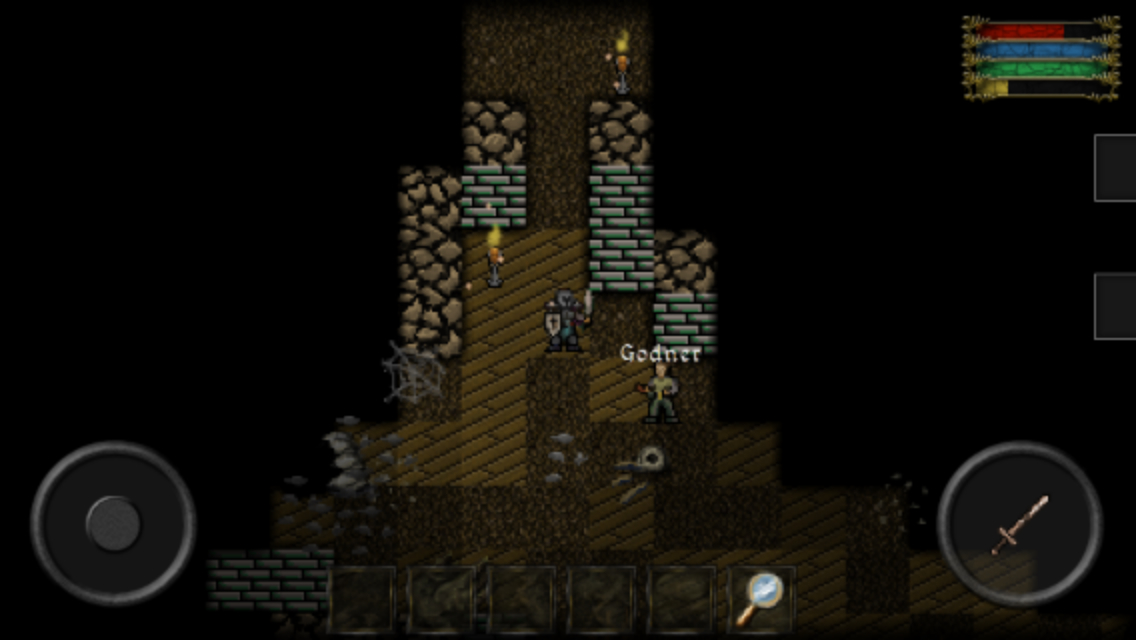
That’s just my take on 9th Dawn, though. What do you all think? Let me know by posting in the comments below, dropping in on the Official RPG Reload Club thread, or by tweeting me at @RPGReload. This game is going to be the topic of this month’s RPG Reload Podcast, too, so if you have any questions about the game or anything else you’d like us to answer, please drop us a line at [email protected]. As for me, I’ll be back next week with another RPG. Thanks for reading!
Next Week’s Reload: Dragons Odyssey Frane ($5.99)